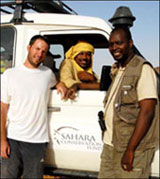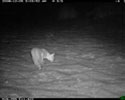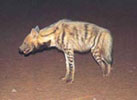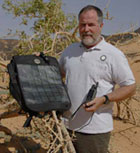![[space]](graphics/space.gif)
FENNEC FOX /
RED FOX

Philosophy

Success Story:
New Reserve Created

Partnership with
Sahara Conservation Fund

How You Can Help

Other Species
To Benefit
THE CONSERVE WILDLIFE
FOUNDATION OF NJ

Piping Plover
|
How You Can Help
![[space]](graphics/space.gif) |
![[space]](graphics/space.gif) |
 |
Getting around:
![[space]](graphics/space.gif) Running a field study with nine species of carnivores over an area as vast and remote as the 10,000 km2 Termit/Tin Toumma region requires considerable resources. The field team comprised of a carnivore biologist and two local assistants will spend up to 2 months in the field radio tracking the three fox and two small cat species, and setting camera traps to document the presence of the larger and more elusive species like caracal, jackal, hyena and cheetah. The research team needs a safe and extremely reliable vehicle to traverse the challenging desert terrain in search of the fennec and other small carnivores. A typical vehicle fully outfitted for this duty costs $45,000 to acquire, fuel, maintain and operate for the year. Contributions towards this would be greatly appreciated! Running a field study with nine species of carnivores over an area as vast and remote as the 10,000 km2 Termit/Tin Toumma region requires considerable resources. The field team comprised of a carnivore biologist and two local assistants will spend up to 2 months in the field radio tracking the three fox and two small cat species, and setting camera traps to document the presence of the larger and more elusive species like caracal, jackal, hyena and cheetah. The research team needs a safe and extremely reliable vehicle to traverse the challenging desert terrain in search of the fennec and other small carnivores. A typical vehicle fully outfitted for this duty costs $45,000 to acquire, fuel, maintain and operate for the year. Contributions towards this would be greatly appreciated! |
Camera Traps:
![[space]](graphics/space.gif) Camera traps are invaluable tools for confirming the presence of shy animals, like the African wild cat (left) and the fennec fox (right). Photos from camera traps can be used to document what habitats or areas different species are using. They can also be used to count and identify individual animals since in some species like the striped hyena (far right) and cheetah have unique markings. Camera traps will be the best way to locate and study the desert cheetahs since they appear to be in such low number and are wary of humans. A single digital camera trap costs $625.00. Camera traps are invaluable tools for confirming the presence of shy animals, like the African wild cat (left) and the fennec fox (right). Photos from camera traps can be used to document what habitats or areas different species are using. They can also be used to count and identify individual animals since in some species like the striped hyena (far right) and cheetah have unique markings. Camera traps will be the best way to locate and study the desert cheetahs since they appear to be in such low number and are wary of humans. A single digital camera trap costs $625.00.
 ![[space]](graphics/space.gif)  ![[space]](graphics/space.gif)  ![[space]](graphics/space.gif) 
 |
Capturing local involvement and support:
![[space]](graphics/space.gif) SCF employs local people who help protect the wildlife from poachers and who act as wildlife scouts. $600 per year goes a long way to providing work for a scout and engaging another local Nigerian as an advocate for conservation. SCF employs local people who help protect the wildlife from poachers and who act as wildlife scouts. $600 per year goes a long way to providing work for a scout and engaging another local Nigerian as an advocate for conservation.
|
 Bringing more power to conservation: Bringing more power to conservation:
![[space]](graphics/space.gif) To be kind to the planet the field team will use solar panels and solar backpacks to harness the power of the readily available sunshine to recharge the GPS units, satellite phone, laptop and camera trap batteries. Solar backpacks cost $250.00 and can power the smaller equipment, but larger solar panels costing $850.00 each are required to charge the laptop computer and the telemetry receivers. To be kind to the planet the field team will use solar panels and solar backpacks to harness the power of the readily available sunshine to recharge the GPS units, satellite phone, laptop and camera trap batteries. Solar backpacks cost $250.00 and can power the smaller equipment, but larger solar panels costing $850.00 each are required to charge the laptop computer and the telemetry receivers.
|





![]() Camera traps are invaluable tools for confirming the presence of shy animals, like the African wild cat (left) and the fennec fox (right). Photos from camera traps can be used to document what habitats or areas different species are using. They can also be used to count and identify individual animals since in some species like the striped hyena (far right) and cheetah have unique markings. Camera traps will be the best way to locate and study the desert cheetahs since they appear to be in such low number and are wary of humans. A single digital camera trap costs $625.00.
Camera traps are invaluable tools for confirming the presence of shy animals, like the African wild cat (left) and the fennec fox (right). Photos from camera traps can be used to document what habitats or areas different species are using. They can also be used to count and identify individual animals since in some species like the striped hyena (far right) and cheetah have unique markings. Camera traps will be the best way to locate and study the desert cheetahs since they appear to be in such low number and are wary of humans. A single digital camera trap costs $625.00.

![]()

![]()

![]()


 Bringing more power to conservation:
Bringing more power to conservation: 

